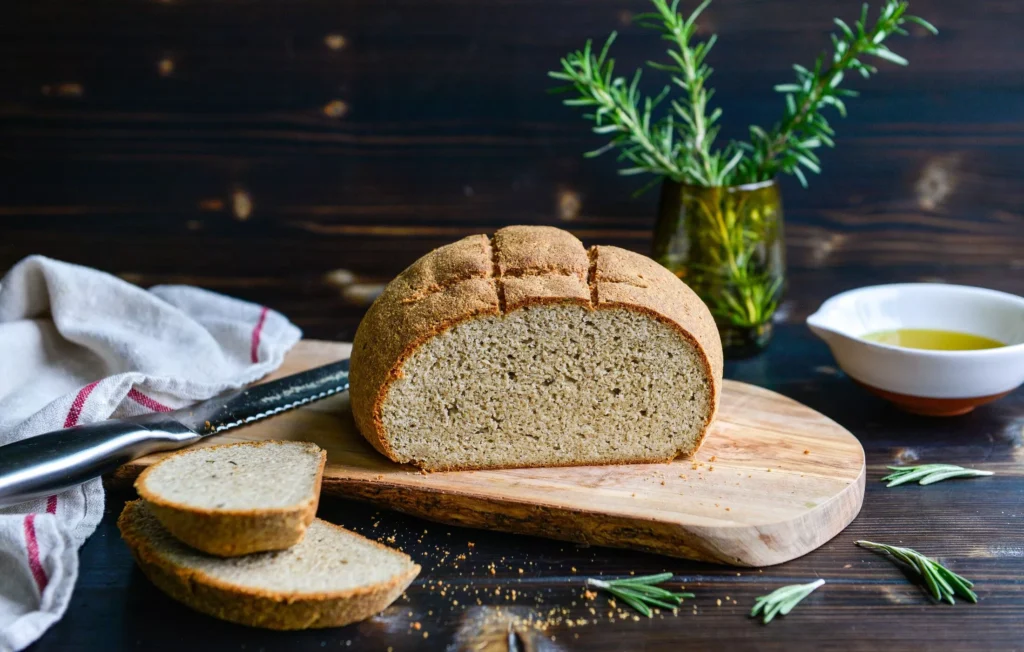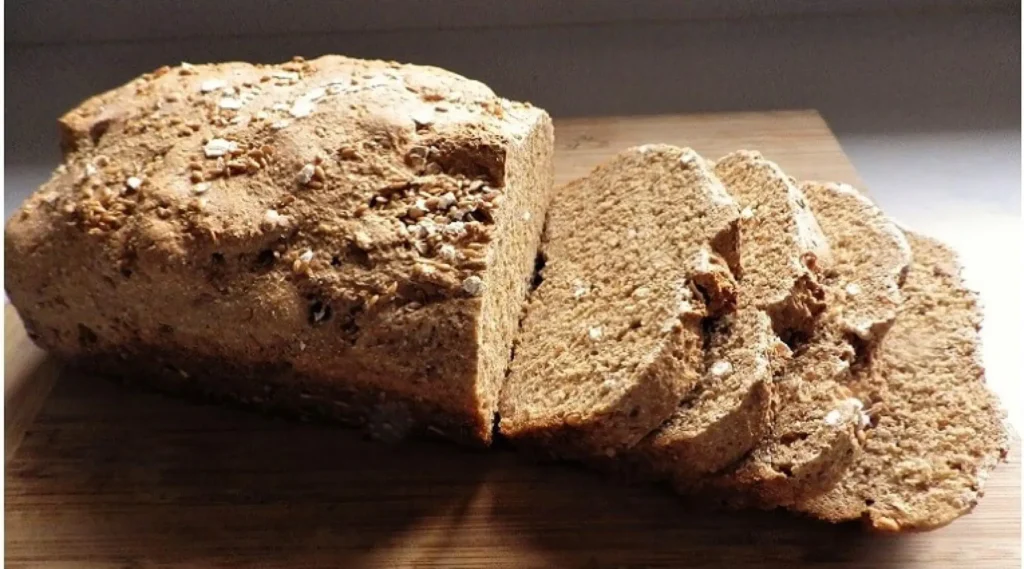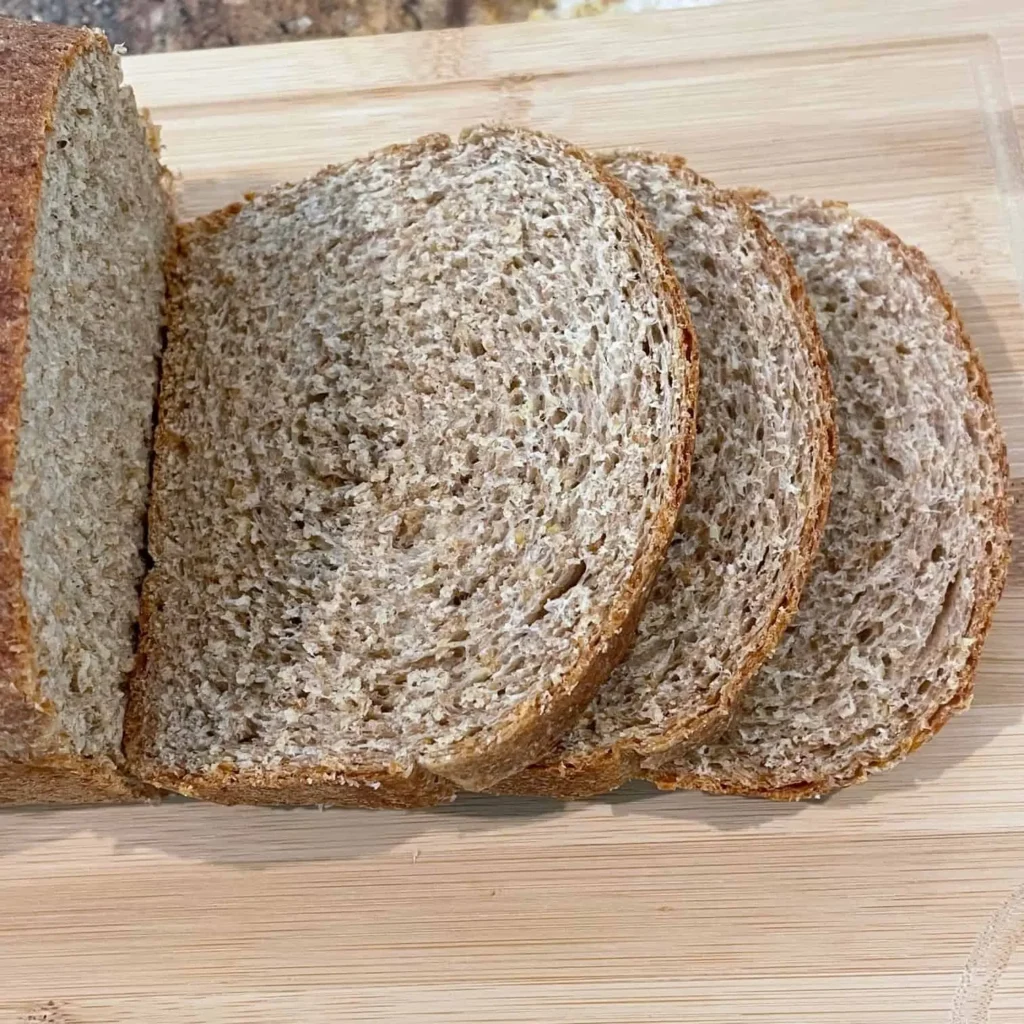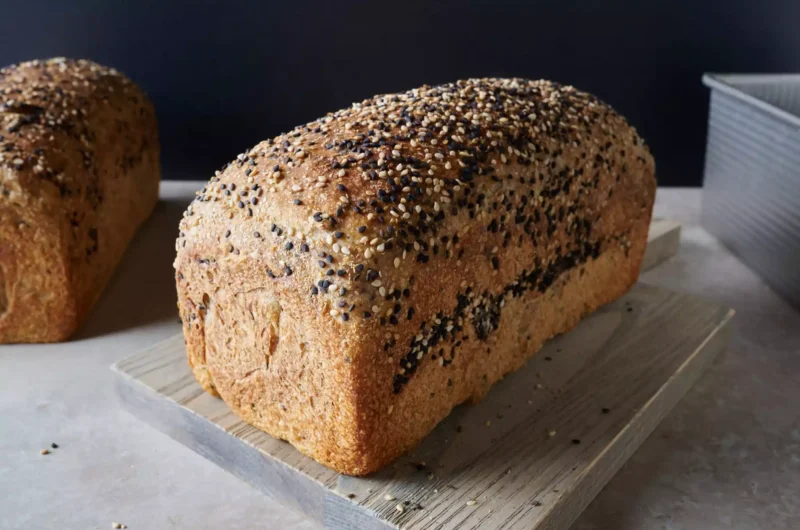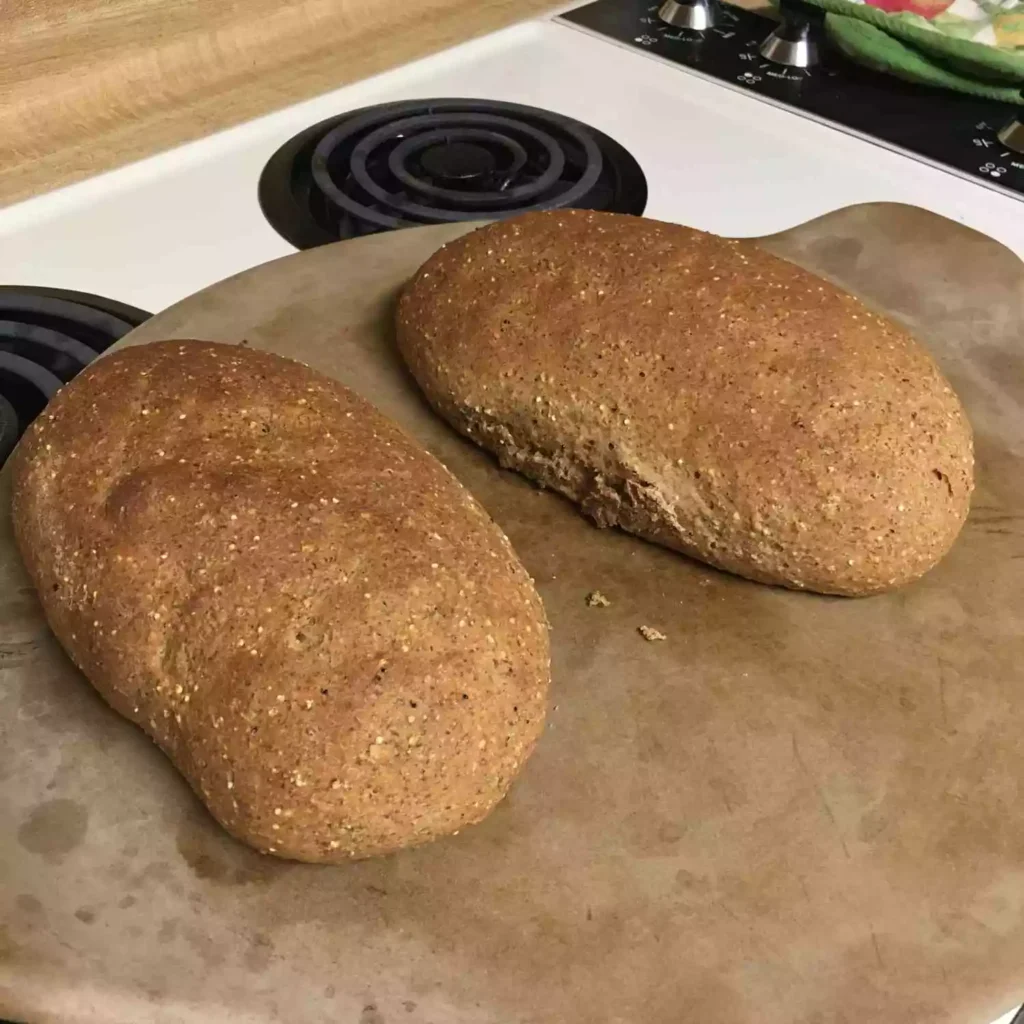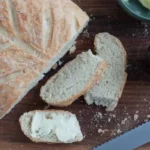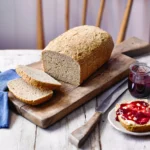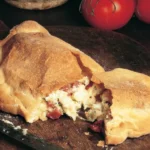Are you tired of the same old store-bought bread that leaves you feeling as empty as a deflated balloon? If you’re craving a healthier option that’s packed with fiber and flavor, then look no further.
In this discussion, we will uncover the secrets to creating a homemade high fiber bread that will leave you satisfied and ready to take on the day.
So, put on your apron and get ready to embark on a culinary adventure that will revolutionize your sandwich game.
Contents
- 1 Key Takeaways
- 2 Choosing the Right Flour
- 3 Adding Fiber-Rich Ingredients
- 4 The Importance of Proper Mixing
- 5 Baking and Cooling Techniques
- 6 Enjoying Your Homemade High Fiber Bread
- 7 High Fiber Bread Recipe
- 8 Nutrition facts
- 9 Frequently Asked Questions
- 9.1 Can I Use All-Purpose Flour Instead of Whole Wheat Flour for This High Fiber Bread Recipe?
- 9.2 What Are Some Examples of Fiber-Rich Ingredients That Can Be Added to the Bread Dough?
- 9.3 How Long Should I Mix the Bread Dough for to Ensure Proper Gluten Development?
- 9.4 What Temperature and Baking Time Should I Follow to Achieve the Best Results?
- 9.5 Can I Freeze the Bread to Extend Its Shelf Life?
- 10 Can Spelt Bread Be a High Fiber Alternative?
- 11 Conclusion
Key Takeaways
- Choosing the right flour is important for high fiber bread, such as whole wheat, whole grain, or stone-ground flours.
- Adding fiber-rich ingredients like chia seeds, flaxseeds, and oats can increase the fiber content and add flavor to the bread.
- Proper mixing is crucial to develop gluten and create a light and airy texture in high fiber bread.
- Baking and cooling techniques, such as monitoring baking time, cooling on a wire rack, and storing in airtight containers, help maintain the quality and freshness of the bread.
Choosing the Right Flour
To ensure the best results for your high fiber bread recipe, it’s crucial to carefully select the appropriate flour for your baking needs. Choosing the right grains is the first step in this process. Whole grains are an excellent choice as they contain all parts of the grain, including the bran, germ, and endosperm, providing more fiber and nutrients compared to refined grains. Look for flours labeled as whole wheat, whole grain, or stone-ground to ensure you’re getting the full nutritional benefits.
However, if you’re looking for alternative flour options, there are several choices available. One popular option is almond flour, made from finely ground almonds. It’s low in carbs and high in healthy fats, making it a suitable choice for those following a low-carb or gluten-free diet.
Another option is coconut flour, which is high in fiber and low in carbs. It adds a unique flavor to your bread and is suitable for those with nut allergies. Additionally, you can try using oat flour, which is made from ground oats and is rich in fiber and nutrients. It adds a slightly sweet and nutty flavor to your bread.
Other alternative flours include quinoa flour, buckwheat flour, and chickpea flour, each offering their own distinct taste and nutritional benefits. When selecting the right flour for your high fiber bread recipe, consider your dietary preferences and any potential allergies. Experiment with different options to find the one that best suits your needs and taste preferences.
Adding Fiber-Rich Ingredients
After carefully selecting the appropriate flour for your high fiber bread recipe, the next step is to incorporate fiber-rich ingredients that will enhance the nutritional value of your bread. Adding these ingredients not only boosts the fiber content, but also provides numerous health benefits.
Here are three fiber-rich ingredients you can include in your high fiber bread:
- Chia seeds: These tiny seeds are packed with fiber, omega-3 fatty acids, and antioxidants. They help improve digestion, lower cholesterol levels, and promote heart health.
- Flaxseeds: Flaxseeds are another excellent source of fiber, as well as lignans, which are beneficial plant compounds. They can help regulate blood sugar levels, promote healthy digestion, and reduce the risk of heart disease.
- Oats: Adding oats to your bread recipe not only increases the fiber content but also adds a delightful texture. Oats are rich in soluble fiber, which helps lower cholesterol levels and promotes a feeling of fullness.
The Importance of Proper Mixing
Proper mixing is essential for achieving a light and airy texture in your high fiber bread. The role of gluten development cannot be overstated when it comes to creating a well-structured bread loaf. Gluten, a protein found in wheat flour, gives bread its elasticity and strength. Through mixing, the gluten strands align and form a network that traps air bubbles produced by yeast fermentation. This network allows the dough to rise and expand, resulting in a fluffy and tender bread.
Using a stand mixer can greatly benefit the mixing process. Not only does it save you time and effort, but it also ensures thorough and consistent mixing. The powerful motor and various attachments of a stand mixer allow for efficient gluten development without overworking the dough. This is particularly important when working with high fiber bread, as excessive mixing can lead to a denser texture.
To emphasize the benefits of using a stand mixer, consider the following table:
| Benefits of Using a Stand Mixer |
|---|
| Time-saving |
| Consistent mixing |
| Efficient gluten development |
| Prevents overworking the dough |
| Achieves a light and airy texture |
Baking and Cooling Techniques
Achieving a light and airy texture in your high fiber bread extends beyond proper mixing; it also requires careful attention to baking and cooling techniques. To ensure your bread turns out perfectly, here are some tips to consider:
- Baking Time: Monitor your bread closely while it bakes. High fiber bread tends to brown quickly due to the higher sugar content from ingredients like honey or molasses. Reduce the baking time if you notice the bread is browning too rapidly. A lower temperature for a longer duration can also help maintain a moist and tender crumb.
- Oven Placement: Place your bread in the middle rack of the oven for even heat distribution. Avoid placing it too close to the top or bottom, as this can result in uneven baking or burnt crusts.
- Cooling and Storage: Once your bread is baked, remove it from the oven and let it cool on a wire rack. This allows air to circulate and prevents moisture buildup, which can make the bread soggy. Once cooled, store the bread in airtight bags or containers to maintain its freshness and prevent it from drying out.
Enjoying Your Homemade High Fiber Bread
To fully enjoy your homemade high fiber bread, try pairing it with your favorite spreads or using it as a base for sandwiches. Not only is high fiber bread a delicious and healthy option, but it also offers numerous health benefits. Fiber is essential for maintaining a healthy digestive system, promoting regular bowel movements, and reducing the risk of certain diseases such as heart disease, diabetes, and certain types of cancer. By incorporating high fiber bread into your diet, you can improve your overall well-being.
To give you some inspiration, here are a few creative variations you can try with your homemade high fiber bread:
High Fiber Bread Recipe
Course: Baking/BreadCuisine: Multi-cuisineDifficulty: Moderate16
servings20
20
minutes400
This recipe strikes a balance between simplicity and nutrition, making it suitable for those looking to enhance their daily fiber intake. Whether you're a seasoned home baker or someone just starting to explore the world of bread-making, this recipe offers a rewarding experience, resulting in a homemade loaf that's not only good for you but also a delightful addition to any meal. Enjoy the wholesome goodness of this High Fiber Bread as toast for breakfast, a sandwich at lunch, or a side for dinner.
Ingredients
2 1/2 cups whole wheat flour
1 1/2 cups all-purpose flour
1 1/2 cups oat bran
1/2 cup ground flaxseed
2 tablespoons chia seeds
2 teaspoons active dry yeast
1 teaspoon salt
1 tablespoon honey or maple syrup
2 tablespoons olive oil
1 3/4 cups warm water (about 110°F or 43°C)
Directions
- In a large mixing bowl, combine the warm water and honey/maple syrup. Sprinkle the yeast over the water and let it sit for about 5 minutes until it becomes frothy.
- In another bowl, mix together the whole wheat flour, all-purpose flour, oat bran, ground flaxseed, chia seeds, and salt.
- Add the dry ingredients to the yeast mixture gradually, stirring continuously. Add the olive oil and continue to mix until the dough comes together.
- Knead the dough on a floured surface for about 8-10 minutes until it becomes smooth and elastic.
- Place the dough in a greased bowl, cover it with a clean kitchen towel, and let it rise in a warm place for about 1-1.5 hours or until it doubles in size.
- Preheat your oven to 375°F (190°C).
- Punch down the risen dough and shape it into a loaf. Place the shaped dough into a greased loaf pan.
- Let the dough rise again for about 30 minutes.
- Bake in the preheated oven for 30-40 minutes or until the bread is golden brown and sounds hollow when tapped on the bottom.
- Allow the bread to cool in the pan for 10 minutes before transferring it to a wire rack to cool completely.
| Spread | Ingredients | Instructions |
|---|---|---|
| Avocado | Ripe avocado, lemon juice, salt, and pepper | 1. Mash the avocado in a bowl and add lemon juice, salt, and pepper. 2. Spread the avocado mixture on your high fiber bread and enjoy. |
| Hummus | Chickpeas, garlic, olive oil, tahini, lemon juice, salt, and cumin | 1. Blend all the ingredients together until smooth. 2. Spread the hummus on your high fiber bread and top with your favorite vegetables. |
| Nut butter | Almonds, cashews, or peanuts, salt, and honey or maple syrup | 1. Roast the nuts in the oven until golden brown. 2. Blend the roasted nuts with salt and sweetener of choice until creamy. 3. Spread the nut butter on your high fiber bread and add sliced fruits for extra flavor. |
Nutrition facts
- Calories: 120-150 kcal
- Total Fat: 3-5g
- Saturated Fat: 0.5-1g
- Cholesterol: 0mg
- Sodium: 150-200mg
- Total Carbohydrates: 20-25g
- Dietary Fiber: 4-6g
- Sugars: 1-2g
- Protein: 4-6g
Frequently Asked Questions
Can I Use All-Purpose Flour Instead of Whole Wheat Flour for This High Fiber Bread Recipe?
You can use all-purpose flour as an alternative to whole wheat flour in this high fiber bread recipe. However, keep in mind that whole wheat flour offers more nutritional benefits such as fiber, vitamins, and minerals.
What Are Some Examples of Fiber-Rich Ingredients That Can Be Added to the Bread Dough?
To add fiber to your bread dough, consider ingredients like chia seeds, flaxseeds, oats, or bran. These can boost the nutritional value of your bread. You can also incorporate fiber into other baked goods by using whole grain flours and adding fruits or vegetables.
How Long Should I Mix the Bread Dough for to Ensure Proper Gluten Development?
To ensure proper gluten development, mix the bread dough for about 8-10 minutes. This will help create a strong and elastic dough. If you’re experiencing issues, troubleshoot by adjusting hydration levels and using proper kneading techniques.
What Temperature and Baking Time Should I Follow to Achieve the Best Results?
To achieve the best results, follow this advice: vary the temperature and baking time to find what works best for you. Aim for a soft and moist high fiber bread. Enjoy the freedom of experimenting in the kitchen!
Can I Freeze the Bread to Extend Its Shelf Life?
Yes, you can freeze the bread to extend its shelf life. Freezing bread slows down the staling process and keeps it fresh for longer. Just make sure to wrap it tightly in plastic wrap or a freezer bag to prevent freezer burn.
Can Spelt Bread Be a High Fiber Alternative?
Looking for a high fiber alternative to regular bread? Delicious spelt bread recipes could be the solution. Spelt is a nutrient-rich grain that offers more fiber than traditional wheat, making it a great choice for those looking to increase their fiber intake. Try incorporating spelt bread into your diet for a delicious and healthy option.
Conclusion
In conclusion, by following this high fiber bread recipe, you can enjoy a delicious and nutritious homemade bread that’s packed with fiber.
Not only does this bread provide essential nutrients, but it also promotes digestive health and helps in weight management.
So, why settle for store-bought bread when you can easily make your own fiber-rich loaf? Take the leap and experience the benefits of this mouthwatering bread that will leave you feeling satisfied and nourished.
Don’t wait, start baking today!

